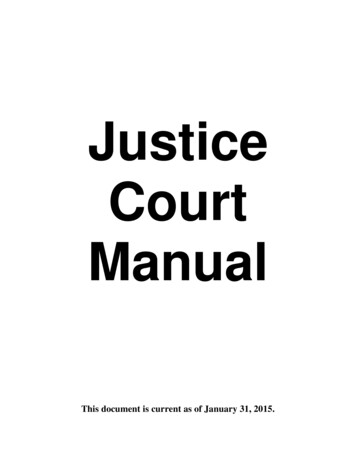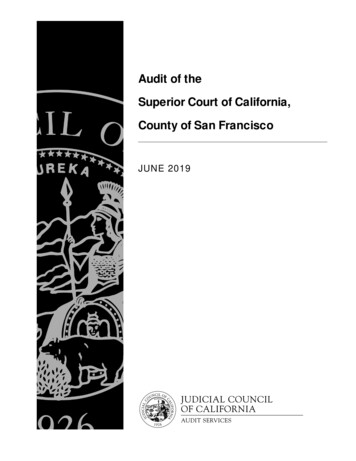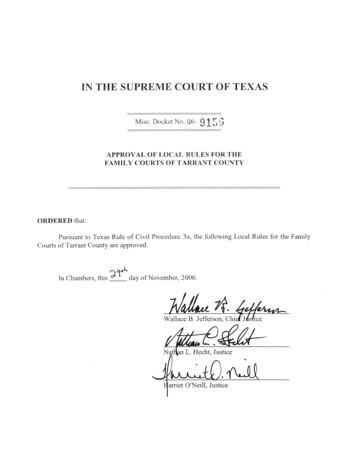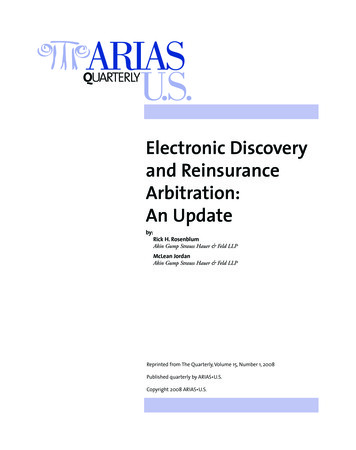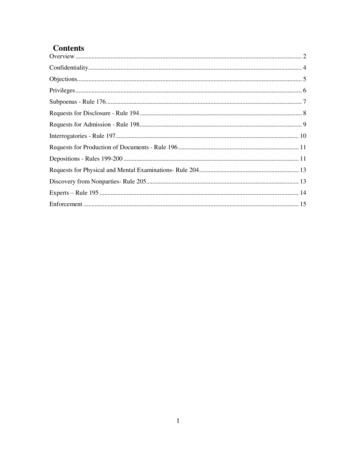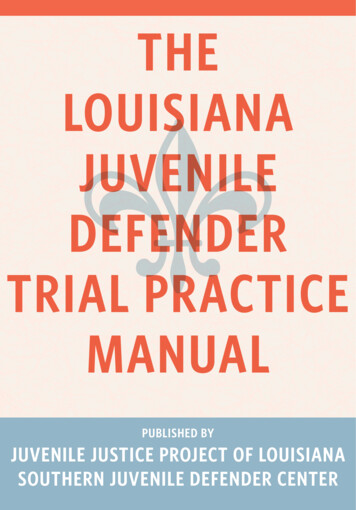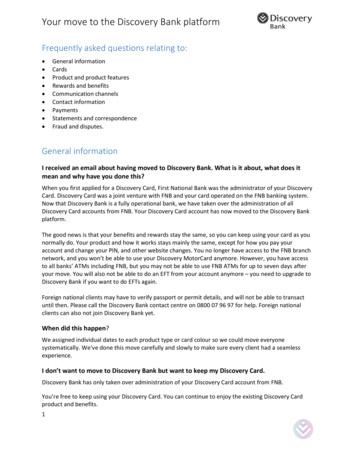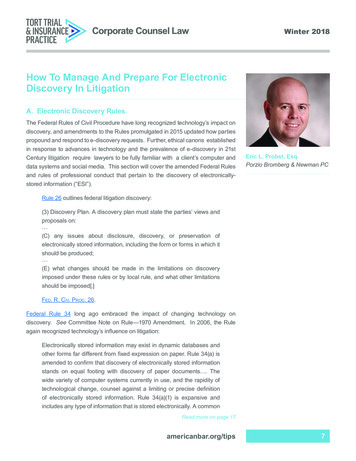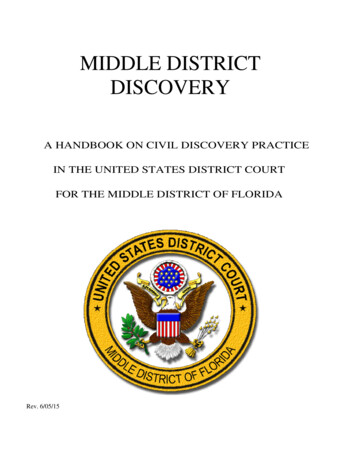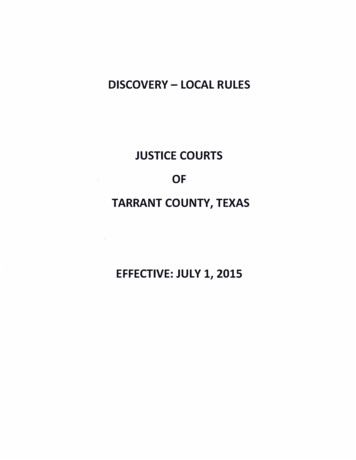
Transcription
DISCOVERY- LOCAL RULESJUSTICE COURTSOFTARRANT COUNTY, TEXASEFFECTIVE: JULY 1, 2015
TARRANT COUNTY JUSTICE COURTS - LOCAL RULES FOR DISCOVERYOBJECTIVESIn accordance with law, the Justice Courts conduct proceedings to ensure the fair,expeditious, and inexpensive resolution of all cases and matters under itsjurisdiction. In addition, these Rules are intended to provide a limited, yet not allinclusive resource for litigants and those who appear before these Courts.DISCOVERY GUIDELINESIn an attempt to have uniformity and save litigants time and expense resultingfrom hearings on discovery matters the following guidelines will generally befollowed by the Justice Courts on matters pertaining to discovery request.The grant of discovery is limited by the legitimate interests of the opposing partyto avoid overly broad requests, harassment, or disclosure of privilegedinformation.THE GENERAL SCOPE OF DISCOVERY ORDERSThe scope of discovery is within the trial court's discretion, and the trial court willmake an effort to impose reasonable discovery limits."In general, a party may obtain discovery regarding any matter that is notprivileged and is relevant to the subject matter of the pending action, whether itrelates to the claim or defense of the party seeking discovery or the claim ordefense of any other party."[Note: In an attempt to maintain fairness and consistency, this rule is drawnin part from the Texas Rule of Civil Procedure (TRCP) 192.3]
REFERENCESI.Part V of the Texas Rules of Civil Procedure (TRCP) 500.2 - Discovery isdefined as:TRCP 500.2 (k) Discovery" is the process through which parties obtaininformation from each other in order to prepare for trial or enforce ajudgment. The term does not refer to any information that a party is entitledto under applicable law.11II.TRCP 500.3 "Application Of Rules In Justice Court Cases"TRCP 500.3 (e) Application of Other Rules"The other Rules of Civil Procedure and the Rules of Evidence do not applyexcept:11(1) when the judge hearing the case determines that a particular rule must befollowed to ensure that the proceedings are fair to all parties; or(2) when otherwise specifically provided by law or these rules.Ill.TRCP 500.9 - "Discovery"TRCP 500.9 (a) "Pretrial Discovery"o Pretrial discovery is limited to that which the judge considers reasonable andnecessary.o Any requests for pretrial discovery must be presented to the court forapproval by written motion.o The motion must be served on the responding party.o Unless a hearing is requested, the judge may rule on the motion without ahearing.o The discovery request must not be served on the responding party unless thejudge issues a signed order approving the request.o Failure to comply with a discovery order can result in sanctions, includingdismissal of the case or an order to pay the other party's discovery expenses.
TRCP 500.9 (b) "Post- judgment Discovery11o Post-judgment discovery is not required to be filed with the court.o The party requesting discovery must give the responding party at least 30days to respond to a post-judgment discovery request.o The responding party may file a written objection with the court within 30days of receiving the request.o If an objection is filed, the judge must hold a hearing to determine if therequest is valid.o If the objection is denied, the judge must order the party to respond to therequest.o If the objection is upheld, the judge may reform the request or dismiss itentirely.GENERALLY ACCEPTABLE PRE-TRIAL DISCOVERY REQUESTSGeneral Disclosure Request:The following discoverable information is acceptable and considered to be aGeneral Disclosure Request for Pre-Trial Discovery requests, and no objection orassertion of work product is permitted to a request under this general disclosureRule.A party may request any or all of the following:(a) The correct names of the parties to the lawsuit;(b) The name, address, and telephone number of any potential parties;(c) The legal theories and, in general, the factual bases of the responding party'sclaims or defenses (the responding party need not marshal all evidence that maybe offered at trial);(d) The amount and any method of calculating economic damages;
(e) The name, address, and telephone number of persons having knowledge ofrelevant facts, and a brief statement of each identified person's connection withthe case;(f) For any testifying expert:(1) the expert's name, address, and telephone number;(2) the subject matter on which the expert will testify;(3) the general substance of the expert's mental impressions and opinionsand a brief summary of the basis for them, or if the expert is not retainedby, employed by, or otherwise subject to the control of the respondingparty, documents reflecting such information;(4) if the expert is retained by, employed by, or otherwise subject to thecontrol of the responding party:(A) all documents, tangible things, reports, models, or data compilationsthat have been provided to, reviewed by, or prepared by or for theexpert in anticipation of the expert's testimony; and(B) the expert's current resume and bibliography;(g) Any written or otherwise recorded statements of a witness, who is a personwith knowledge of relevant facts;(h) In a suit alleging physical or mental injury and damages from theoccurrence that is the subject of the case, all medical records and bills that arereasonably related to the injuries or damages asserted or, in lieu thereof, anauthorization permitting the disclosure of such medical records and bills;(i)The name, address and telephone number of any person who may bedesignated as a responsible third party.[Note: In an attempt to maintain fairness and consistency, this rule is drawn inpart from the Texas Rule of Civil Procedure 194 - Requests for Disclosure]
DISCOVERY - TIME PERIODS and LIMITATIONSThe court, on its own motion or initiative, may limit the discovery methods if thecourt determines that:(a) The discovery sought is unreasonably cumulative or duplicative, or isobtainable from some other source that is more convenient, less burdensome, orless expensive; or(b) The burden or expense of the proposed discovery outweighs its likely benefit,taking into account the needs of the case, the amount in controversy, the parties'resources, the importance of the issues at stake in the litigation, and theimportance of the proposed discovery in resolving the issues.[Note: In an attempt to maintain fairness and consistency, this rule is drawnin part from the Texas Rule of Civil Procedure (TRCP) 192.4]Additionally, in an attempt to have uniformity and save litigants time and expenseresulting from discovery matters the following time periods and limitations willgenerally be followed by the Justice Courts:1. Pre-trial Discovery Period -All discovery must be conducted during thediscovery period which begins when the judge issues a signed order approvingthe discovery request and concludes the earlier of a date set by the court or nolater than 30 days before trial.2. Each party may have no more than six (6) hours in total to examine and cross examine all witnesses in oral depositions.3. A party may serve on any other party no more than fifteen (15) writtenInterrogatories. Each discrete subpart of an interrogatory is considered aseparate interrogatory.4. A party may serve on any other party no more than fifteen (15) Requests forProduction. Each discrete subpart of a Request for Production is considered aseparate Request for Production.
5. A party may serve on any other party no more than fifteen {15} Requests forAdmissions. Each discrete subpart of a Request for Admission is considered aseparate Request for Admission.[Note: In an attempt to maintain fairness and consistency, this rule is drawn inpart from the Texas Rule of Civil Procedure (TRCP} 190.2 -Level 1 Discovery]PRE-TRIAL DISCOVERY: DUTY TO TIMELY AMEND OR SUPPLEMENT WRITTENDISCOVERY, AND EXCLUSION OF EVIDENCE AND EXCEPTIONSIf a party learns that their response to written pre-trial discovery wasincomplete or incorrect when made, or although complete or correct whenmade, is no longer complete or correct, the party must, within a reasonablyprompt time after such is discovered, amend and supplement their response.Generally, a reasonably prompt time is considered to be within 14 days of theparty discovering their response needs amending or supplementing, and nolater than 21 days before trial.PRE-TRIAL DISCOVERY: FAILURE TO TIMELY RESPOND- EFFECT ON TRIALA party who fails to make, amend or supplement a pre-trial discovery responsein a reasonably prompt time may not be permitted introduce in evidence thematerial or information that was not timely disclosed, or offer the testimony ofa witness (other than a named party) who was not timely identified unless thecourt finds that:{1} There was good cause for the failure to timely make, amend, orsupplement the discovery response; or{2} The failure to timely make, amend, or supplement the discovery responsewill not unfairly surprise or unfairly prejudice the other parties.
(3) Even if a party seeking to introduce evidence or call a witness fails to meetthe burden of (1) or (2) above, the court within its broad discretion and toensure fairness to all parties, may grant a continuance of the trial to allowresponses to be made, amended, or supplemented and to allow opposingparties to conduct discovery regarding any new information presented by thatresponse.[Note: In an attempt to maintain fairness and consistency, this rule is drawn inpart from the Texas Rule of Civil Procedure 193.6 - Failure to Timely Respond Effect on Trial]DISPUTES - PRE-TRIAL and POST-JUDGMENT DISCOVERYThe parties shall attempt to resolve any discovery question, problem or disputebefore intervention by the court. Any discovery motion shall contain a Certificateof Discovery Conference by the requesting party or counsel filing the same.CERTIFICATE of DISCOVERY CONFERENCE (3 Examples)Example #1- Where ALL of Discovery is Agreed to:Certificate of Discovery Conference: I hereby certify that reasonable efforts weremade by the Movant to resolve all disputes without the necessity of courtintervention and the parties (movant and party or counsel for the parties) wereable to confer and reach agreement as to the Discovery request(s) of theMovant/defendant/parties. The parties therefore ask the court to enter suchAgreed Discovery Order as to the items agreed to.
Example #2 - Where PART of Discovery is Agreed to and Court is to Rule Only onItems in Dispute:Certificate of Discovery Conference: I hereby certify that reasonable efforts weremade by the Movant to resolve this dispute without the necessity of courtintervention/ and the parties (movant and party or counsel for the parties) wereable to confer and reach agreement as to the Discovery request(s) of theMovant/defendant/parties. The parties have reached agreement to all Discoveryrequests submitted by the Movant/Parties except the following: . Theparties therefore ask the court to enter such order as to some items agreed to andrule on the Discovery items in dispute.Example #3 -A Discovery Conference was Not HeldCertificate of Discovery Conference: A discovery conference was not held with(name of opposing party or opposing attorney) on the merits of this motionbecause (explanation of your inability to confer.)DISPUTES- HEARINGS by TELEPHONIC or ELECTRONIC MEANSOn written request of a party and with consent of the Judge, a matter involvingJustice Court discovery may be conducted by telephone or other electronicmeans. The moving party shall be responsible for advising opposing parties of themethod and time of hearing and; if so notified by the court, shall be responsiblefor arranging the conference call.POST-JUDGMENT DISCOVERY- GENERALLYGenerally, for post-judgment discovery matters, the parties should refer to theTexas Rules of Civil Procedure, TRCP 190-205.
POST-JUDGMENT DISCOVERY-WRITTEN OBJECTIONS AND OTHER ISSUESBEFORE the COURTWhen post-judgment discovery, written objections and other issues are broughtbefore the court, the court may take into consideration: party representation ornon-representation and witnesses; and, TRCP 500.3 "Application Of Rules InJustice Court Cases," and TRCP 500.6 "Judge to Develop the Case" to ensure acorrect judgment and speedy disposition, and TRCP 500.9 "Discovery" as theserules pertain to discovery being limited to what the judge considers reasonableand necessary, and within the court's broad discretion, whenever necessary, toensure fairness to all parties.
APPROVED 17·i:!!Jf:fit:::WhiiitJustice of the Peace, Precinct OneTarrant County, TJustice of the Peace, Precinct TwoTarrant County, TexasTarrant County, TexasJ stice o the Peace, Precinct FourTarrant County, Texas -Hon. Sergio De LeonJustice of the Peace, Precinct FiveTarrant County, TexasHon. Gary RitchieJustice of the Peace, Precinct SixTarrant County, TexasHon. Matt HayesJustice of the Peace, Precinct SevenTarrant County, TexasTarrant aunty, Texas
1. Pre-trial Discovery Period -All discovery must be conducted during the discovery period which begins when the judge issues a signed order approving the discovery request and concludes the earlier of a date set by the court or no later than 30 days before trial. 2. Each party may have no more than six (6) hours in total to examine and cross
